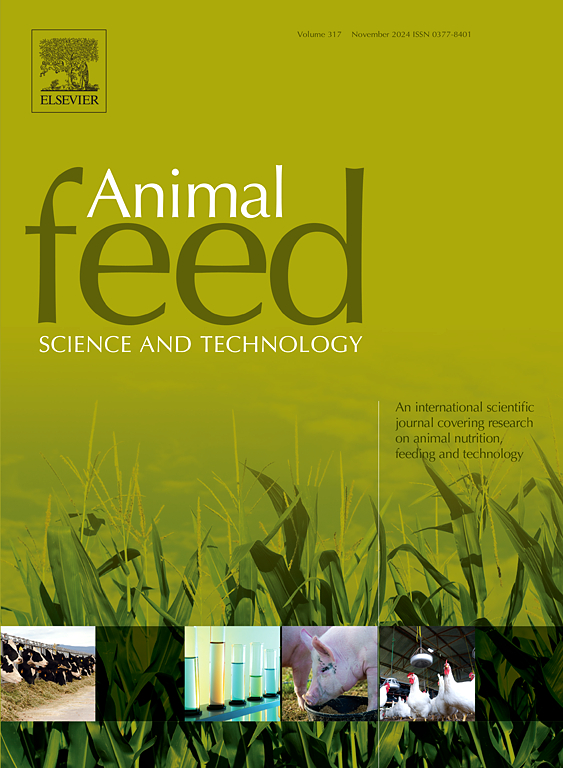补充生物炭对泌乳奶牛饲料利用率、产奶量和甲烷排放的影响
IF 2.7
2区 农林科学
Q1 AGRICULTURE, DAIRY & ANIMAL SCIENCE
引用次数: 0
摘要
在农业领域,使用生物炭(BC)作为碳储存和土壤改良手段的趋势日益明显,有研究表明,给牲畜饲喂生物炭可以改善动物健康和生产性能,并减少肠道甲烷排放。本研究的目的是调查在一组泌乳荷斯坦奶牛的平衡日粮中添加 BC 是否会对其牛奶产量和质量、甲烷排放、养分消化率和健康产生影响。在为期两个 36 天的交叉实验中,8 头奶牛分别接受添加和不添加 1% DM BC 的基础日粮。在每个阶段的最后一周,奶牛被关在拴系栏中,对其产奶量和成分、采食量和营养消化率以及血液参数进行量化。最后两天,在呼吸室中测量甲烷排放量。结果表明,添加 BC 对任何测量变量都没有显著影响。奶牛的自主采食量没有受到添加 BC 的影响(P=0.52),没有一头奶牛因添加 BC 而出现健康问题。奶产量(P>0.46)或成分(P>0.23)没有增加,甲烷排放量也没有受到显著影响(P>0.37)。虽然不能排除给有健康问题或日粮不良的动物饲喂 BC 有益的影响,但本实验的数据表明,BC 并不是提高奶牛生产性能或减少甲烷排放的有效饲料添加剂。本文章由计算机程序翻译,如有差异,请以英文原文为准。
The effect of biochar supplementation on feed utilization, milk production and methane emission in lactating dairy cows
There is an increasing trend in agriculture to use biochar (BC) as a means for carbon storage and soil improvement, and it has been suggested, that feeding BC to livestock can improve animal health and performance, and reduce enteric methane emissions. The aim of this study was to investigate if adding BC to a balanced ration of a group of lactating Holstein dairy cows had an effect on their milk yield and quality, methane emission, nutrient digestibility and health. In a crossover experiment lasting for two 36-day periods, eight cows received their basal ration with and without 1 % DM BC. During the last week of each period, the cows were kept in tie stalls where milk yield and composition, feed intake and nutrient digestibility, as well as blood parameters were quantified. On the last two days, methane emissions were measured in respiration chambers. The results indicate that there was no significant effect of the addition of BC on any of the measured variables. Voluntary intake was not affected by the addition of BC (P=0.52) and none of the cows exhibited health problems in response to the treatment. There was no increase in milk yield (P>0.46) or composition (P>0.23) and methane emissions were not significantly affected (P>0.37). While the beneficial effects of feeding BC to animals suffering from health problems or receiving a poor diet cannot be excluded, the data of this experiment indicate that BC is not an effective feed additive to improve performance or reduce methane emission in dairy cows.
求助全文
通过发布文献求助,成功后即可免费获取论文全文。
去求助
来源期刊

Animal Feed Science and Technology
农林科学-奶制品与动物科学
CiteScore
6.00
自引率
6.20%
发文量
266
审稿时长
3 months
期刊介绍:
Animal Feed Science and Technology is a unique journal publishing scientific papers of international interest focusing on animal feeds and their feeding.
Papers describing research on feed for ruminants and non-ruminants, including poultry, horses, companion animals and aquatic animals, are welcome.
The journal covers the following areas:
Nutritive value of feeds (e.g., assessment, improvement)
Methods of conserving and processing feeds that affect their nutritional value
Agronomic and climatic factors influencing the nutritive value of feeds
Utilization of feeds and the improvement of such
Metabolic, production, reproduction and health responses, as well as potential environmental impacts, of diet inputs and feed technologies (e.g., feeds, feed additives, feed components, mycotoxins)
Mathematical models relating directly to animal-feed interactions
Analytical and experimental methods for feed evaluation
Environmental impacts of feed technologies in animal production.
 求助内容:
求助内容: 应助结果提醒方式:
应助结果提醒方式:


